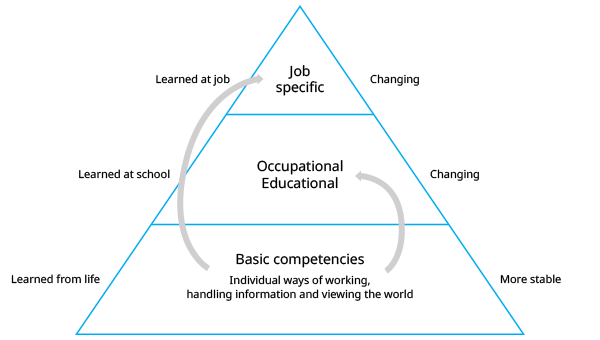< Lessons

Ponderings about one's work career emerge as part of normal development in teenage years or in early adulthood at the latest. Experiences from school, family traditions, role models and advice constitute the basis for young people in making choices about suitable education and occupations. External influences such as peer pressure, social desirability and timely fads may as well strongly affect your choices. Therefore, an important part of planning one's career is also excluding educational and occupational fields that seem less suitable for oneself. Many people don't have any greater difficulty in making choices but some people experience uncertainty about their occupational direction and can make significant changes during their studies or early work years.
Digitalization and AI are currently disrupting work life. Changes in jobs, occupations and competencies lead people even in established work careers to examine their careers and competencies. Increasing are also situations where individuals in middle of their work careers feel that their current or foreseeable tasks don't meet with their basic competencies or desired ways of thinking and doing things. Mismatches in the current job may also concern specific competencies or work domains. Awareness of one's characteristic behavior and thinking tendencies can provide solutions to such situations. Examination of one's competencies can also lead to discovery of new competency potentials. The disruption of work, touching upon nearly everyone, makes career planning also an important part of well-being at work.
Basic work competencies are people's competent ways of performing in independent activities, leading others, collaborating, planning and solving problems and viewing the world and oneself. They may be described as 20 "Experts in work" from a Quality seeker to an Optimist. It is important to realize that the basic competencies don't cover the whole picture of people's competence at work. An individual's competence at work can be described in pyramid form composed of educational, occupational and job specific competency elements situated "on top" of the basic competencies, see figure below.
Basic competencies, described as "Experts in work" derive from people's characteristic motivations, ways of thinking and attitudes developing earlier in life and being more stable in time than educational, occupational and job specific competencies. They give direction to the pyramid's "upper" competencies regardless of the person's age, level of education, work experience or employment status.
The three competency elements are arranged in the order of learning. It all begins with development of Basic competencies which then give direction to Educational and Occupational competencies which then give direction to Job specific competence. Basic competencies give direction and constantly shape all later educational, occupational and job competence.

The answer to the question who am I in ACTION becomes clarified by studying the following experts: Quality vs. Results seeker, Action vs. Thought leader, Communicator, Advisor, Listener vs. Follower of one's own path. The answer to the question who am I in PLANNING AND PROBLEM SOLVING becomes defined by studying the the following experts: Fact-based vs. Idea generator, Viewer of Practical vs. Complex pictures, Analytic vs. Intuitive thinker and Cautious vs. Risk taking implementer. And, the answer to the question who I am in VIEWING the world and myself becomes clarified by studying experts such as: Proponent of Order vs. Variety as well as Realist vs. Optimist.
ACTION
Actional or behavioral competence derives from behavior driving motivations, what one wants to do and how one wants to act (see Lesson: What is motivation?). In action, are you a Quality or Results seeker, Action or Thought leader, a Communicator, Advisor, Listener or Follower of your own path? They all represent competence in some jobs. Everyone is a bit of each but it is important to know which expert characters represent your best competence. From the following eight experts, choose the one that best characterizes your behavior by marking number 1 beside your choice. Then, choose also your second most characteristic and mark number 2 beside your choice.

1. Quality seeker - a focuser who seeks for high and flawless quality. Concentrates on the task at hand and wants to take it into finish before moving on to new things. Proceeds along even, controlled steps and spends time in doing so. Gives the best effort in professional or supporting roles in technical or otherwise clear-cut jobs. In leadership roles occasional micromanagement. Precision, endures routines, goes the extra mile.

2. Results seeker - seeks for sizeable, "big" results. Sets high goals and competes with self/others. Seizes opportunities and proceeds along long, risk taking, corner cutting and hasty steps. Gives the best effort as an entrepreneur or a professional in results oriented, loose-boundaried jobs. Takes on activities with highest payoff, doesn't spend time on details.

3. Action leader - leads others' action. Sets direction to others, gives instructions and orders. Proceeds along determined, straightforward steps. Demanding, overpowers others' resistance and is sometimes bossy. Gives one's best effort in supervisory positions and in jobs involving control of others' conduct. Strong-willed, closes deals, direct feedback and conflict handling.

4. Thought leader - an influencer who leads others' thoughts and impressions. Inspires others through ideas and presentations. Senses what's going on in people's minds and presents uplifting visions. Gives the best effort in supervisory roles and in influencing, marketing things before audiences. Presentation and displaying skills, identification of trends, brand design.

5. Communicator - forms and fosters contacts with others. Friendly, carefree and easily approachable. An information sharing "spokesperson" keeping others posted on things. Gives his/her best effort in professional and supporting work roles centered at direct, face-to-face communication. Networker, organizer of social events, melter of ice.

6. Advisor - guides and supports others. Actively offers his/her advice and instructions to others. Assumes responsibility over others, an empathetic mentor. Gives the best effort in professional, supporting or supervisory roles centered at direct, face-to-face advisory and guidance as in training and education. User experience design.

7. Listener - listens to, serves others. Relies heavily on others and takes care of others' needs even at the expense of his/her own interest, a "right hand" to another. Gives the best effort in professional and supporting roles centered at direct, face-to-face listening as in customer service and care jobs. User experience design, depth interviewing.

8. Follower of one's own path - walks one's own path. Relies heavily on oneself. Holds on to one's principles, withstands external pressure and is less influenced by others. Gives one's best effort in jobs calling for steadfastness as in purchasing, security, inspection, high-pressure negotiation, conflict resolution. Withstands majority/cross pressures, an external problem solver.
PLANNING & PROBLEM SOLVING
Information handling, planning and problem solving is driven by ways of thinking (see also Lesson: What are ways of thinking?). In planning and problem solving, are you Fact-based or an Idea generator, a viewer of the Practical or Complex picture, Analytic or Intuitive thinker, Cautious or Risk taking implementer? Each of them represents competence in some jobs. Everyone is a bit of each but it is important to know which expert figures represent your own best competence. From the following eight experts, choose the one that best characterizes your planning and problem solving and mark 1 beside it. Then, choose your second most characteristic expert and mark 2 beside it.

9. Fact-based - favors well-proven approaches. Approaches things based on tried facts with the downside of shutting eyes from new ideas and openings. A "doer", best suited to action-centered practical jobs where things are known and to jobs where facts must be attended to. Has feet on the ground, spots shaky ideas.

10. Idea generator - favors novel approaches. Approaches things by seeking for new ideas and openings. Looks at things from an original, creative standpoint with the downside of bypassing facts. A "thinker", best suited to jobs requiring new ideas, to content production and planning jobs. Creativity, product/service design.

11. Viewer of the practical picture - directs attention to visible practical matters. Focuses attention on concrete things that meet the eye and doesn't spend time in theorizing. Is able to simplify, "wrap up" complicated things with the downside of bypassing true complexity. A "doer" and best suited to action-centered jobs, to practical information & educational environments. Has feet on the ground, operative/tactical sense.

12. Viewer of the complex picture - directs attention to complex wholes. Focuses on things beyond the concrete and what meets the eye. Delineates contexts, causes and effects with the downside of over-theorizing, turning simple things into complicated ones. A "thinker", best suited to heavily planning-centered jobs, theoretical information and educational environments. Concept design, systems intelligence, strategic sense.

13. Analytic thinker - intellect and logic. Comes up with rational, standard solutions which is competence particularly in logical processes (material processes). In irregular processes (people processes) this may lead to mechanistic, "by-the-book" solutions. Best suited to information and educational environments which involve measurement, calculation, quantities, cf. technical + natural science studies. Objectivity, graph reading, math skills.

14. Intuitive thinker - feeling and instinct. Comes up with instinct driven, potentially disruptive and at best creative solutions addressing the situation's unique features which may be far-fetched and work poorly in practice. Sense of irregular, whimsical processes (people processes). Best suited to information & educational environments involving interpretation and qualitative data, cf. humanities and art studies. Creativity, sense of nuances.

15. Cautious implementer - contemplates and ascertains. Implements things with caution and taking due time which is competence in jobs requiring judgment, research or involving critical consequences. The downside is often procrastination and being late, "missing the train". A "thinker", best suited to jobs requiring sound judgment, decision preparation and planning. Risk awareness, "better safe than sorry".

16. Risk taking implementer - quickly seizes opportunities. Implements things quickly, by taking risks. Moves quickly from one thing to another, may skip details and act hastily. This marks competence in competitive environments. A "doer", best suited to quick-tempoed, action-centered jobs which require alert responding and risk taking. Action orientation, gets quickly down to business, doesn't remain sitting on things.
VIEWING
Individuals' ways of viewing the world and oneself derive from different attitudes. Proponents of Order feel at home in orderly work environments while Proponents of Variety enjoy variable work environments. Realists and Optimists vary in their success expectancies, required in different jobs. In viewing the world and yourself are you a Proponent of Order or of Variety, a Realist or an Optimist? From the two experts in work environments, choose the more characteristic one, 17 or 18 and mark 1 beside it. From the two experts in expecting success, choose the more characteristic one, 19 or 20 and mark 1 beside it.

17. Proponent of order - favors regularity. Favors clear rules and expects the same from others. Feels good in stable work environments involving consistent processes and clear-cut responsibilities. Best suited to jobs requiring detection of irregularities and errors cf. financial administration and process monitoring. Organized and cost aware, organization person, "walker of the narrow path".

18. Proponent of variety - favors the new and varied. Favors variety, scans for new terrains. Feels good in mobile work environments involving variety and surprises. Best suited to mobile and creative work. Adapts to situations and tolerates ambiguity, cf. expatriate jobs and creative work. Variety seeking can be behavioral ("adventurer") or ideational ("artist"), a free soul, "grass is greener on the other side".

19. Realist - aware of limited resources. Has only a partial belief in success. Realistic in appraisals, detects problems, risks and obstacles and doesn't beautify things: "there is no free lunch". The "glass is half empty" philosophy may also lead to underestimation of odds. Best suited to jobs that require awareness of risks and resources cf. rescue occupations. Problem awareness, cost-benefit analysis.

20. Optimist - strong belief in success. Has a strong belief in success. Energetic, action spirited and carefree, cf. "problem out of sight, out of mind". Becomes excited and jumps fearlessly into new things. The "glass is half full" philosophy may also lead to skipping of problems and overestimation of odds. Suited to many kind of jobs which call for zeal and ability to jump into new things.
LASTLY
As continuation, you may request a certified career coach for feedback on your choices. You may also explore the "Expert's playbook" which broadens your view on eg., team roles, learning styles and ways of coping in stress, characteristic of each expert character. Finally, you may also fill out the standardized 224 item WOPI test used in recruitment. It offers a comprehensive and detailed coverage on the same expert characters, thus elaborating your identity at work. The career coach then prepares a comprehensive picture of your competence and may also pose specifying questions concerning your current or targeted educational, occupational and job contents.
In addition to the above freely downloadable pdf form, an alternative way to make choices on the experts is to use the card pack of "20 Experts in work", either a physical pack or its mobile phone version. The expert cards can also be used for captivating group exercises where people make guesses on each others as experts. The cards serve also in teambuilding exercises where the playful cards serve as a pretext in getting to know one another while at the same time building a sense of togetherness throughout the organization.
From Experts in work to career planning

The need to plan one's career may arise in many situations. Seeking for an educational path, entering and progressing on one's work career, starting a new career or merely developing one's competence are situations calling for closer study of one's career and competence. Among 20 "Experts in work", choose six characters most characteristic of yourself and get an answer to the identity question: Who am I at work? Make your choices by downloading the PDF form (PC) or the app (PC+Mobile) to be published soon. See also: Basic competencies at work.
Introduction
Ponderings about one's work career emerge as part of normal development in teenage years or in early adulthood at the latest. Experiences from school, family traditions, role models and advice constitute the basis for young people in making choices about suitable education and occupations. External influences such as peer pressure, social desirability and timely fads may as well strongly affect your choices. Therefore, an important part of planning one's career is also excluding educational and occupational fields that seem less suitable for oneself. Many people don't have any greater difficulty in making choices but some people experience uncertainty about their occupational direction and can make significant changes during their studies or early work years.
Digitalization and AI are currently disrupting work life. Changes in jobs, occupations and competencies lead people even in established work careers to examine their careers and competencies. Increasing are also situations where individuals in middle of their work careers feel that their current or foreseeable tasks don't meet with their basic competencies or desired ways of thinking and doing things. Mismatches in the current job may also concern specific competencies or work domains. Awareness of one's characteristic behavior and thinking tendencies can provide solutions to such situations. Examination of one's competencies can also lead to discovery of new competency potentials. The disruption of work, touching upon nearly everyone, makes career planning also an important part of well-being at work.
20 Experts in work
Basic work competencies are people's competent ways of performing in independent activities, leading others, collaborating, planning and solving problems and viewing the world and oneself. They may be described as 20 "Experts in work" from a Quality seeker to an Optimist. It is important to realize that the basic competencies don't cover the whole picture of people's competence at work. An individual's competence at work can be described in pyramid form composed of educational, occupational and job specific competency elements situated "on top" of the basic competencies, see figure below.
Basic competencies, described as "Experts in work" derive from people's characteristic motivations, ways of thinking and attitudes developing earlier in life and being more stable in time than educational, occupational and job specific competencies. They give direction to the pyramid's "upper" competencies regardless of the person's age, level of education, work experience or employment status.
The three competency elements are arranged in the order of learning. It all begins with development of Basic competencies which then give direction to Educational and Occupational competencies which then give direction to Job specific competence. Basic competencies give direction and constantly shape all later educational, occupational and job competence.
Pyramid model of competence

The answer to the question who am I in ACTION becomes clarified by studying the following experts: Quality vs. Results seeker, Action vs. Thought leader, Communicator, Advisor, Listener vs. Follower of one's own path. The answer to the question who am I in PLANNING AND PROBLEM SOLVING becomes defined by studying the the following experts: Fact-based vs. Idea generator, Viewer of Practical vs. Complex pictures, Analytic vs. Intuitive thinker and Cautious vs. Risk taking implementer. And, the answer to the question who I am in VIEWING the world and myself becomes clarified by studying experts such as: Proponent of Order vs. Variety as well as Realist vs. Optimist.
ACTION
Actional or behavioral competence derives from behavior driving motivations, what one wants to do and how one wants to act (see Lesson: What is motivation?). In action, are you a Quality or Results seeker, Action or Thought leader, a Communicator, Advisor, Listener or Follower of your own path? They all represent competence in some jobs. Everyone is a bit of each but it is important to know which expert characters represent your best competence. From the following eight experts, choose the one that best characterizes your behavior by marking number 1 beside your choice. Then, choose also your second most characteristic and mark number 2 beside your choice.

1. Quality seeker - a focuser who seeks for high and flawless quality. Concentrates on the task at hand and wants to take it into finish before moving on to new things. Proceeds along even, controlled steps and spends time in doing so. Gives the best effort in professional or supporting roles in technical or otherwise clear-cut jobs. In leadership roles occasional micromanagement. Precision, endures routines, goes the extra mile.

2. Results seeker - seeks for sizeable, "big" results. Sets high goals and competes with self/others. Seizes opportunities and proceeds along long, risk taking, corner cutting and hasty steps. Gives the best effort as an entrepreneur or a professional in results oriented, loose-boundaried jobs. Takes on activities with highest payoff, doesn't spend time on details.

3. Action leader - leads others' action. Sets direction to others, gives instructions and orders. Proceeds along determined, straightforward steps. Demanding, overpowers others' resistance and is sometimes bossy. Gives one's best effort in supervisory positions and in jobs involving control of others' conduct. Strong-willed, closes deals, direct feedback and conflict handling.

4. Thought leader - an influencer who leads others' thoughts and impressions. Inspires others through ideas and presentations. Senses what's going on in people's minds and presents uplifting visions. Gives the best effort in supervisory roles and in influencing, marketing things before audiences. Presentation and displaying skills, identification of trends, brand design.

5. Communicator - forms and fosters contacts with others. Friendly, carefree and easily approachable. An information sharing "spokesperson" keeping others posted on things. Gives his/her best effort in professional and supporting work roles centered at direct, face-to-face communication. Networker, organizer of social events, melter of ice.

6. Advisor - guides and supports others. Actively offers his/her advice and instructions to others. Assumes responsibility over others, an empathetic mentor. Gives the best effort in professional, supporting or supervisory roles centered at direct, face-to-face advisory and guidance as in training and education. User experience design.

7. Listener - listens to, serves others. Relies heavily on others and takes care of others' needs even at the expense of his/her own interest, a "right hand" to another. Gives the best effort in professional and supporting roles centered at direct, face-to-face listening as in customer service and care jobs. User experience design, depth interviewing.

8. Follower of one's own path - walks one's own path. Relies heavily on oneself. Holds on to one's principles, withstands external pressure and is less influenced by others. Gives one's best effort in jobs calling for steadfastness as in purchasing, security, inspection, high-pressure negotiation, conflict resolution. Withstands majority/cross pressures, an external problem solver.
PLANNING & PROBLEM SOLVING
Information handling, planning and problem solving is driven by ways of thinking (see also Lesson: What are ways of thinking?). In planning and problem solving, are you Fact-based or an Idea generator, a viewer of the Practical or Complex picture, Analytic or Intuitive thinker, Cautious or Risk taking implementer? Each of them represents competence in some jobs. Everyone is a bit of each but it is important to know which expert figures represent your own best competence. From the following eight experts, choose the one that best characterizes your planning and problem solving and mark 1 beside it. Then, choose your second most characteristic expert and mark 2 beside it.

9. Fact-based - favors well-proven approaches. Approaches things based on tried facts with the downside of shutting eyes from new ideas and openings. A "doer", best suited to action-centered practical jobs where things are known and to jobs where facts must be attended to. Has feet on the ground, spots shaky ideas.

10. Idea generator - favors novel approaches. Approaches things by seeking for new ideas and openings. Looks at things from an original, creative standpoint with the downside of bypassing facts. A "thinker", best suited to jobs requiring new ideas, to content production and planning jobs. Creativity, product/service design.

11. Viewer of the practical picture - directs attention to visible practical matters. Focuses attention on concrete things that meet the eye and doesn't spend time in theorizing. Is able to simplify, "wrap up" complicated things with the downside of bypassing true complexity. A "doer" and best suited to action-centered jobs, to practical information & educational environments. Has feet on the ground, operative/tactical sense.

12. Viewer of the complex picture - directs attention to complex wholes. Focuses on things beyond the concrete and what meets the eye. Delineates contexts, causes and effects with the downside of over-theorizing, turning simple things into complicated ones. A "thinker", best suited to heavily planning-centered jobs, theoretical information and educational environments. Concept design, systems intelligence, strategic sense.

13. Analytic thinker - intellect and logic. Comes up with rational, standard solutions which is competence particularly in logical processes (material processes). In irregular processes (people processes) this may lead to mechanistic, "by-the-book" solutions. Best suited to information and educational environments which involve measurement, calculation, quantities, cf. technical + natural science studies. Objectivity, graph reading, math skills.

14. Intuitive thinker - feeling and instinct. Comes up with instinct driven, potentially disruptive and at best creative solutions addressing the situation's unique features which may be far-fetched and work poorly in practice. Sense of irregular, whimsical processes (people processes). Best suited to information & educational environments involving interpretation and qualitative data, cf. humanities and art studies. Creativity, sense of nuances.

15. Cautious implementer - contemplates and ascertains. Implements things with caution and taking due time which is competence in jobs requiring judgment, research or involving critical consequences. The downside is often procrastination and being late, "missing the train". A "thinker", best suited to jobs requiring sound judgment, decision preparation and planning. Risk awareness, "better safe than sorry".

16. Risk taking implementer - quickly seizes opportunities. Implements things quickly, by taking risks. Moves quickly from one thing to another, may skip details and act hastily. This marks competence in competitive environments. A "doer", best suited to quick-tempoed, action-centered jobs which require alert responding and risk taking. Action orientation, gets quickly down to business, doesn't remain sitting on things.
VIEWING
Individuals' ways of viewing the world and oneself derive from different attitudes. Proponents of Order feel at home in orderly work environments while Proponents of Variety enjoy variable work environments. Realists and Optimists vary in their success expectancies, required in different jobs. In viewing the world and yourself are you a Proponent of Order or of Variety, a Realist or an Optimist? From the two experts in work environments, choose the more characteristic one, 17 or 18 and mark 1 beside it. From the two experts in expecting success, choose the more characteristic one, 19 or 20 and mark 1 beside it.

17. Proponent of order - favors regularity. Favors clear rules and expects the same from others. Feels good in stable work environments involving consistent processes and clear-cut responsibilities. Best suited to jobs requiring detection of irregularities and errors cf. financial administration and process monitoring. Organized and cost aware, organization person, "walker of the narrow path".

18. Proponent of variety - favors the new and varied. Favors variety, scans for new terrains. Feels good in mobile work environments involving variety and surprises. Best suited to mobile and creative work. Adapts to situations and tolerates ambiguity, cf. expatriate jobs and creative work. Variety seeking can be behavioral ("adventurer") or ideational ("artist"), a free soul, "grass is greener on the other side".

19. Realist - aware of limited resources. Has only a partial belief in success. Realistic in appraisals, detects problems, risks and obstacles and doesn't beautify things: "there is no free lunch". The "glass is half empty" philosophy may also lead to underestimation of odds. Best suited to jobs that require awareness of risks and resources cf. rescue occupations. Problem awareness, cost-benefit analysis.

20. Optimist - strong belief in success. Has a strong belief in success. Energetic, action spirited and carefree, cf. "problem out of sight, out of mind". Becomes excited and jumps fearlessly into new things. The "glass is half full" philosophy may also lead to skipping of problems and overestimation of odds. Suited to many kind of jobs which call for zeal and ability to jump into new things.
LASTLY
As continuation, you may request a certified career coach for feedback on your choices. You may also explore the "Expert's playbook" which broadens your view on eg., team roles, learning styles and ways of coping in stress, characteristic of each expert character. Finally, you may also fill out the standardized 224 item WOPI test used in recruitment. It offers a comprehensive and detailed coverage on the same expert characters, thus elaborating your identity at work. The career coach then prepares a comprehensive picture of your competence and may also pose specifying questions concerning your current or targeted educational, occupational and job contents.
In addition to the above freely downloadable pdf form, an alternative way to make choices on the experts is to use the card pack of "20 Experts in work", either a physical pack or its mobile phone version. The expert cards can also be used for captivating group exercises where people make guesses on each others as experts. The cards serve also in teambuilding exercises where the playful cards serve as a pretext in getting to know one another while at the same time building a sense of togetherness throughout the organization.
Close
Helsinki (HQ)
Competence Dimensions LtdHelpdesk
GMT +3:00 - ± 1:00helpdesk(at)wopi.net